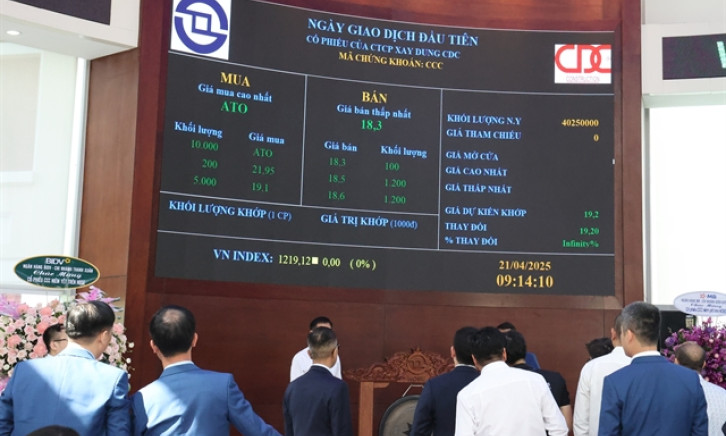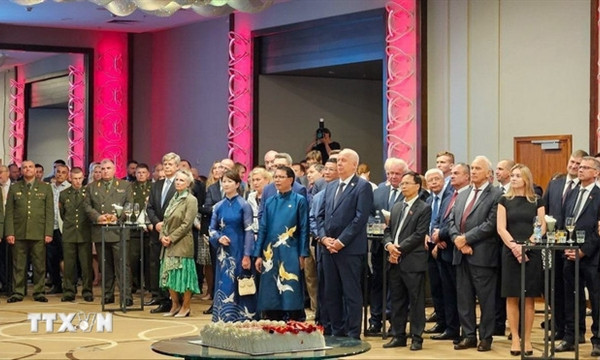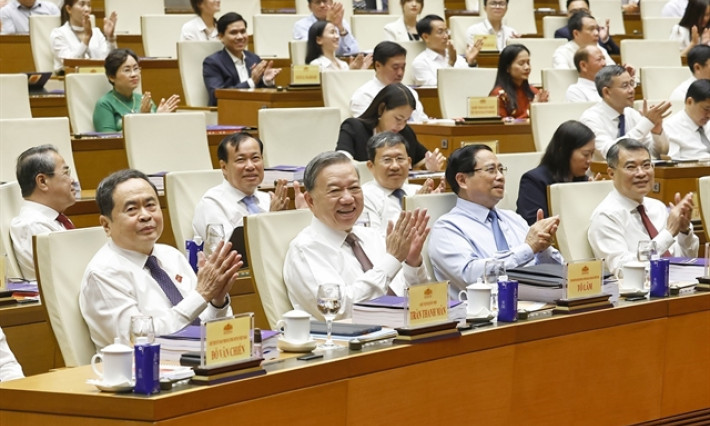Party Chief through the eyes of the 108 Military Central Hospital’ doctors and nurses
Over the past years, they had cared for him and were deeply moved by his kindness, determination and dedication.
At the Hà Nội’s 108 Military Central Hospital, Party General Secretary Nguyễn Phú Trọng was seen as a straightforward, approachable, simple, humorous leader who was dedicated to his work for the Party, the country and the people until his final moments.
During his years of medical treatment, General Secretary Nguyễn Phú Trọng always felt secure, trusted and adhered to the treatment plans provided by the medical experts and staff at the hospital.
The Party Chief passed away at the 108 Military Central Hospital in the afternoon of July 19. His passing caused immense sorrow among all the medical staff at the hospital, many of whom wept openly. Over the past four years, they had cared for him and were deeply moved by his kindness and dedication.
Major General Lê Hữu Song, director of the 108 Military Central Hospital, expressed his profound grief and special affection for the General Secretary. He noted that the hospital was honoured to be entrusted by the Party, the State and the Army with the task of providing healthcare for senior officials and the public, especially in their care for General Secretary Nguyễn Phú Trọng.
To care for the General Secretary, the Central Healthcare Protection Committee and the 108 Military Central Hospital consulted with both domestic and international medical experts to provide the best treatment plans.
All the medical staff at the hospital held a special affection for the General Secretary, akin to that for a grandfather, a father or a close family member. This bond was fostered by the General Secretary's own affection and dedication to the hospital staff and his work for the people and the country.
"After every consultation with the Central Healthcare Protection Committee, when we presented the treatment plan to the General Secretary, he always warmly responded with 'I comply.' This gave us confidence, relieved all fatigue and motivated us to provide the best possible care for him," said Song.
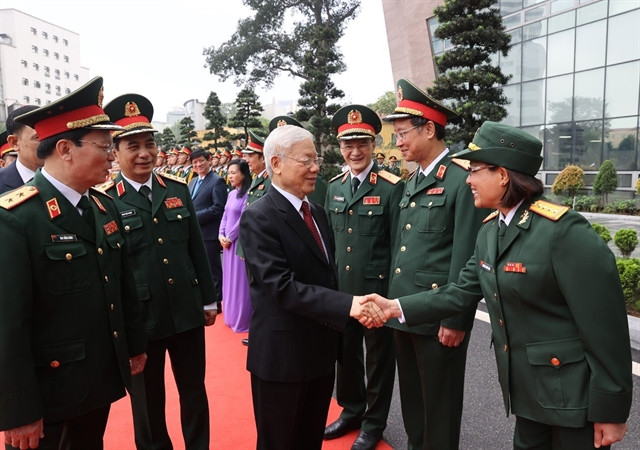
Song recalled that throughout the treatment process, despite feeling fatigued, General Secretary Nguyễn Phú Trọng always made an effort to gradually regain his health. Even when he felt too tired to eat, he adhered to the prescribed diet to maintain his strength for work. His determination inspired the hospital staff to work even harder.
In particular, during his final days as his health declined, General Secretary Nguyễn Phú Trọng continued to work diligently. Although the medical team had anticipated the progression of his illness, they were still astonished by his work ethic.
"That impression made us feel humbled. The General Secretary's energy inspired us to strive even harder," he said.
Doctor Nguyễn Phương Đông from the hospital’s Department of Health Protection and Care for Central Officials, who had directly cared for the General Secretary for many years, shared that even as his health weakened, he maintained his work schedule.
"Every day, from around 9am to 9.30am, the General Secretary would listen to reports from his assistants and secretaries. After 10.30am and in the afternoon, he would meet with Party and State leaders. Whenever he felt well, he would read and study documents.
"He worked until his last breath. On July 13, he was still working, but in the afternoon, we had to place him on a ventilator. In his final moments, knowing we couldn't save him, we felt like we were losing a father, a close family member. Many of us cried. We felt immense sadness, emptiness and a deep sense of loss, as if something sacred had been taken from us," Đông said.
A special and humble patient
To the medical staff, the General Secretary was a special patient because he always cooperated and adhered to treatment plans and he was confident and satisfied with the expertise, dedication and care of the hospital's medical team.
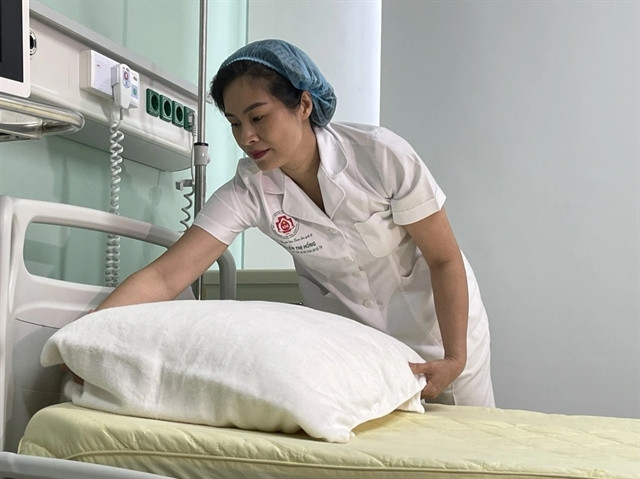
Nurse Nguyễn Thị Hồng, who had the honour of directly caring for the General Secretary over the past four to five years, shared that he was very simple, modest and kind, leaving doctors and nurses with many loving memories and emotions.
"Whenever he met us, he always asked about our children, how they were doing in school, their ages and if we faced any difficulties. When he sat by the river or walked along the corridor, he always chatted happily. He was like family to us, a father or an uncle. He empathised with our hard work and always encouraged us to do our best in caring for patients. Being beside him, we learned from his gentleness and dedication to his work," said Hồng.
Looking towards the room where the General Secretary was under treatment, Hồng, with teary eyes, said: "Even after he left this room, when we returned the next day, our eyes were still drawn to his room. The daily routines, the care activities we performed for him, still lingered in our minds. He left us with so much love and a noble example of a revolutionary soldier."
Admiring the General Secretary's extraordinary work ethic, Hồng mentioned that he rarely took much rest. Upon waking, aside from his morning tea and exercise, he spent his time reading newspapers, working and meeting guests. Only when he felt tired, did he ask to rest.
Hồng said she felt honored to sit beside the General Secretary at each meal.
"When he ate, I encouraged him to eat more because it made him stronger. His favourite dish was yogurt. I felt lucky and honored to take care of him."
The nurse revealed that the General Secretary had a fondness for malt peanut candy. There was always a jar of candy on his desk. Whenever the doctors and nurses gathered around to listen to his stories, he would share the candy, fostering a warm and close atmosphere.
Besides work, during his morning and evening exercise walks along the hospital corridor, the General Secretary loved to sing the song ‘Bài ca Bắc Sơn’ (Bắc Sơn song). The staff on duty would join him in exercise and sing along. The corridor would come alive with music.
Outside his treatment room, a wooden table and chairs were arranged in the corridor as a daily relaxation spot for General Secretary Nguyễn Phú Trọng and the medical staff. His seat faced the Hồng (Red) River. Every day, he would spend time in the morning and late afternoon relaxing, taking in the sunrise and sunset over the river.
During these times, he would discuss events or share lighthearted stories for relaxation. Sometimes, the doctors and nurses would perform physical therapy for him in the corridor. Occasionally, he would recite poems about the scenery and life. More often, he shared the hardships and challenges faced by the medical staff.
These memories remain vivid in the minds of the hospital staff. His example of a model leader – simple, modest, and approachable – serves as a lesson for each medical worker to continue striving, dedicating themselves to their mission of caring for the health of soldiers and the people.




